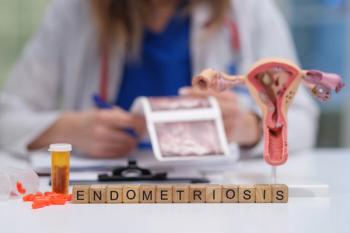
Early postpartum blood pressure self-monitoring with physician-guided medication adjustment was linked to sustained reductions in blood pressure among women with hypertensive pregnancies.

Early postpartum blood pressure self-monitoring with physician-guided medication adjustment was linked to sustained reductions in blood pressure among women with hypertensive pregnancies.

Outdated FDA labeling, insurance uncertainty, and lack of clinic workflows are some barriers Jennifer Karlin, MD, PhD, and colleagues found for user-administered injectable contraceptives.

Updated HRSA cervical cancer screening guidelines prioritize hrHPV testing and patient self-collection, a shift that experts say reflects long-standing evidence.

A single subcutaneous dose of RE104 produced rapid and durable improvements in postpartum depression, supporting advancement into phase 3 development.

Provider assumptions about patient capability remain a major barrier to prescribing self-administered DMPA-SC, despite strong patient-reported benefits and supportive national survey data.

A nationwide Norwegian cohort study suggests that prenatal factors, including fetal growth and maternal diabetes, may influence the risk of developing multiple sclerosis in adulthood.

The extended approval and contracpetive efficacy during use from 3 to 5 years was based on a multicenter, single-arm, open-label study (NCT04626596) conducted in the United States.

A large systematic review and meta-analysis found no evidence that paracetamol use during pregnancy increases the risk of autism, ADHD, or intellectual disability in children.

Jennifer Karlin, MD, PhD, explains how COVID-19 increased awareness of self-administered DMPA, but systemic and provider-level barriers still limit access.

A phase 3 trial of oral brexanolone for postpartum depression will continue unchanged following a favorable DSMB safety review.

A population-based study links minimum wage increases to improved maternal cardiovascular health during pregnancy.

Ashley Michnick explained that early findings support RSVpreF pregnancy safety, while emphasizing the need for continued monitoring.

New data suggest that diabetes risk after menopause is driven by cardiometabolic factors rather than when or how menopause occurs.

A large California cohort study shows that aggregating Asian American and Pacific Islander populations can obscure substantial differences in hypertensive disorder risk during pregnancy.

New HRSA guidelines strengthen cervical cancer prevention by adding self-collected hrHPV testing and clarifying no-cost coverage for additional diagnostic services.

Analysis of internal FDA records reveals that mifepristone’s REMS program was shaped by repeated evidence-based safety reviews.

Gestational diabetes rates have increased by 36% in the United States since 2016, with consistent rises across racial and ethnic groups.

In a recent study, improved postpartum blood pressure control was associated with increased white matter brain volume after hypertensive pregnancy.

A study found that adding low-dose megestrol acetate to standard anti-oestrogen therapy significantly reduced tumor proliferation in women with breast cancer.

A cost-effectiveness model found first-line IV iron dextran offers higher value than oral iron for IDA in women with heavy menstrual bleeding.

A study found higher remnant cholesterol levels are independently associated with increased odds of endometriosis.

Maternal influenza and Tdap vaccination during pregnancy was associated with fewer influenza- and pertussis-related hospital and ED visits in infants younger than 6 months.

Review some of the top stories from the Contemporary OB/GYN website over the past week and catch up on anything you may have missed.

A study found that opioid use during pregnancy is associated with significantly increased maternal complications and adverse neonatal outcomes.

A study found distinct alterations in vaginal and gut microbial composition and function among patients with endometriosis.

New evidence shows that quadrivalent HPV vaccination is associated with a significant reduction in vulvar and vaginal lesion risk.

New research shows COVID-19 vaccination before or during pregnancy significantly lowers the risk of severe maternal illness and reduces rates of preterm birth.

Screen-guided care using the PreTRM blood test reduced preterm birth–related complications and NICU use.

A study found that distinct cervicovaginal microbial patterns are linked to the success of frozen embryo transfer in endometriosis patients.

A study found gestational diabetes prevalence has increased steadily across all racial and ethnic groups over the past decade.